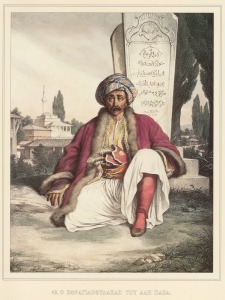Filiz Yazıcıoğlu discusses how the prevalent Greek culture in Ioannina proved to be a threat to Ottoman imperial security in the 19th century
The city of Ioannina is today one of Greece’s biggest cities. Located on the northern fringes of the country, it has direct borders with Albania. In the past, when it was under Ottoman administration, the city was important for both Greeks and Albanians. Aside from being a city with a large Albanian population, it was also an important centre of the Greek enlightenment during the 18th and 19th centuries. Ioannina is considered to have been most striking for its intellectual atmosphere and quality of education compared to other Balkan cities of that time. The main cause of this was the presence of the Greek educational institutions in the region. These institutions played an important role in creating a palpable Greek culture, which would later be perceived as a security problem by the Ottoman governors.
Greek schools and the education of well-known Albanians
In those Greek schools, many children regardless of their religious or national identity were educated together. One of the best schools among them was the Zosimea high school which was founded in 1828 by the Zosimades brothers. Many Albanian intellectuals graduated from this school including members of the Frasheri and Vlora families. These figures later played a key role in the Albanian enlightenment and independence. They also took up important positions in Ottoman administration. Therefore we can assume that on the one hand these schools must have contributed to building the national consciousness of well-known Albanians. But, on the other hand, they (at least some of them) also developed affinity with the Greeks.
The prominent Albanian politician and writer Ekrem Vlora once commented that ‘graduates of this school gain Greek sympathy’. Nevertheless, he remarked that Albanians such as the Frasheri brothers Naim, Sami and Abdül, İsmail Kemal and Abidin Dino graduated from this school also with a national Albanian consciousness. The Albanian poet, politician and activist of Albanian national awaking Ali Aslani was also a graduate, but before coming to the city of Ioannina for secondary school he was educated in Vlora. Many Muslim children in Vlora like Ali Aslani went to Greek churches with their Orthodox friends to learn Greek. İsmail Kemal was surprised when he recognised that all the stories his old Muslim Albanian nanny had told him were Greek myths. He noted that his ancient Greek history and literature teachers made him live in the ‘free climate of ancient Greece’. Later he fell in love with a Greek woman, Kleoniqi Surmeli, who he met in Ruse. They got married in a short time.

The Dispersion of the Nations in the Babel of the Ottomans
When the Ottoman state began to view this Philhellenism as a danger, it was too late. The importance of education was first seriously recognised during the Tanzimat period (a period of reforms that began in 1839 with the Gülhane Hatt-ı Şerif, which was put into practise mainly with the aim of modernizing and securing the empire). However, it took a long time to act on this issue. In Ionnina, the first high school did not open until 1882. Ottoman government inspectors frequently reported that; “the people of this region don’t know Turkish but instead know Greek and are deep under the influence of Hellenism”. In a report on foreign schools dated 1894, there were 595 Greek schools in Ioannina compared to 66 Ottoman schools. With the help of this educational network, Ioannina was under the strong influence of Greek culture.
This fact became a security problem for the government because in critical times, regardless of whether they were Muslim or Orthodox, Albanian leaders adopted the idea of partnership with the Greeks against the Ottoman Empire. Ali Pasha (the vali of Ioannina in 1787-1820 and its most famous inhabitant, often referred to at the time as ‘the lion of Ioannina’ in Europe) was supported by the Rûms. These Rûms were basically the inhabitants of ancient Roman lands, and the term was used to refer the Orthodox Christians and the Grecophones in the Ottoman Empire. When Ali Pasha planned to revolt against the Ottoman Empire, he had their support. His second wife was a Greek woman and he spoke Greek apart from Albanian. Moreover, in a military gathering it appeared that he couldn’t even speak Turkish properly. Ali Pasha was planning to form a Rûm province under his administration. He provided Rûms money and weapons for this purpose.
Later, on 18th March 1847, fourty-four Albanian nobles proposed to the Greek king Otto, the establishment of a Greek-Albanian Kingdom with a shared army and navy when the Ottoman State declared Tanzimat. İsmail Kemal was criticised by some nationalist Albanian leaders for his similar attempts with the Greek government. He believed that Greeks and Albanians came from the same origin and shared a common interest.
The well-known Turkish writer Ömer Seyfettin was captured by Greeks during the defence of the city in the Balkan Wars in 1913. He sounded very pessimistic when he described the Ottoman battalions as the Tower of Babel because the soldiers didn’t know Turkish or understand the Turkish officers. Moreover, villagers were fighting against the Turks with the help of the Greeks. Since the Albanian soldiers saw the Turks as enemies instead of Greeks they left the battlefield. Turks interpreted this fact as treason of Albanians and a result of foreign propaganda. According to Ekrem Vlora, this mistrust above all else showed the narrow-mindedness of the Turks. He thought that Turks were too late to implement the Turkization and Islamization policy. They ignored Albanians in terms of education and culture when the Ottoman Empire was strong and had the power to do it. This was why he, like many other Albanians, remained a stranger to the Turks. He understood their language but didn’t understand their way of thinking and attitudes. As he once confessed, ‘he also didn’t love them’.
Ekrem Vlora was right about one thing: the Ottoman government didn’t pay attention to cultural development, but let the Greeks take care of it. While religion was effective as a tool to create a cultural connection between the Orthodox Albanians and Greeks, education created a similar effect on the Muslim Albanians. Greek was the language to connect with God or to be educated well. As Benedict Anderson claimed in his famous book, languages were important tools in creating imaginary communities.
Consequently, despite centuries of Ottoman administration, it can be claimed that Ioannina never became an Ottoman city in any culturally significant sense. The history of Ioannina proved that cultural identity is as important as other factors in terms of state security.

COVER IMAGE: The Keeper of the Seals of Ali Pasha, by Louis Dupré – 1827 (Public Domain)
Opinion pieces have been published by the Security History Network for the purpose of encouraging informed discussions and debates on topics surrounding security history. The views expressed by authors do not necessarily represent the views of the SHN, its partners, convenors or members.


